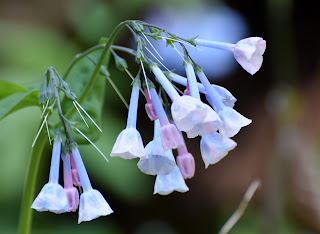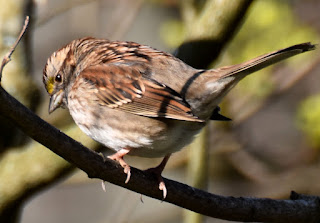Yesterday I saw the signs that we were finally emerging from this cold, wintry spring when I got out the mower and mowed the front lawn. Granted, it was still chilly enough for long sleeves and layers, but the ground had dried enough so the mower wouldn't sink in, and the unruly grass was desperately calling out for a trim. The smell of wild onions, the cheery grape hyacinths nodding their heads in the breeze--our long extended winter might finally be coming to a close.
And this morning I saw the signs that we might eventually emerge from this long, taxing semester when I collected the last set of student drafts. I'll have plenty of grading yet ahead--papers and presentations and final exams--but this is the last time this spring that I'll have to read drafts and make suggestions for revisions.
Back in January I thought this semester would be pretty much like Fall semester except with fewer masks. In fact, for a while it seemed that the biggest problem we'd face this spring was whether--and when--to go to a "mask optional" policy. After a great deal of fuss, we pulled off the masks in late February and suffered no apparent repercussions, but by Spring Break no one was talking about masking anymore. We'd been blindsided by a different kind of problem and we're still not sure what repercussions we will face or for how long.
Sure, everyone knew that some budget-tightening would be needed in the next couple of years, but what we didn't expect--and by we, I mean everyone below the VP level, from students to staff to faculty--what we didn't expect was that the budget train was about to drive right off a cliff. The budget crisis hit hard and fast and repeatedly, causing an epidemic of insomnia and angry meetings. Kind of a bad time to be on Faculty Council! It's easy to say that we're not going to let campus controversies affect the students' learning experiences, but it's hard to accomplish that when cuts are affecting academic offerings and when the people charged with fixing the problems aren't getting any sleep.
And then fall course scheduling season dealt another blow. Changes to our general education curriculum have been causing steady declines in enrollments in my department for a few years, but now the English train has driven off a cliff and I find myself dangling out a broken window, holding on for dear life. Suddenly I see a whole new vista opening up ahead of me: a few final years of teaching freshman comp and the sophomore seminar and other service courses before I fade away into insignificance.
Sure, the changes that were made to my fall teaching schedule will affect only a small number of students, but I feel the difference every day. Today, for instance, as I was introducing my American Lit Survey students to Allen Ginsberg's poem "A Supermarket in California," with its "What peaches and what penumbras! Whole families shopping at night!", I told them they could see how Don DeLillo made use of this image in White Noise, which I'll be teaching in my American Novel class this fall, except I had to stop myself before the sentence was over because of course the American Novel class got cancelled and, depending on how the next few years go and when I decide to retire, I may never get a chance to teach it again.
Those two unexpected blows would have been enough to make this semester difficult--and I'm working really hard to make sure my anger and disappointment don't affect my teaching but I'm not superhuman, especially when I can't sleep, so it's a struggle. But then we've seen a host of smaller disturbances, the most horrible of which can't be written about or discussed openly, to protect the guilty as well as the innocent.
Last week before the Faculty Council meeting we were delicately skirting the perimeter of one of these difficult issues when I was reminded of what happened at the end of my first semester at Marietta College. I was a newbie still feeling her way around campus, and suddenly the place was swarming with cops and the FBI was confiscating equipment and a colleague I'd never even met was being led away in cuffs, soon to be tried and convicted for setting up a secret email server to distribute child pornography.
So last week when a few of us old folks on Council were reminiscing about that long-ago scandal, a fresh-faced junior faculty member asked, "After all that, why didn't you just walk away?"
"Some of us needed the job," I pointed out, but it was more than that. Even at the end of one semester, I knew that Marietta was a place where I could do good work that would be appreciated and occasionally rewarded, and I'd seen enough to suspect that the College could weather this storm and come out the other side stronger.
Is that still true? Possibly. Probably, even. But will I still be here to enjoy the recovery? And if my fingers lose their grip on that bloody broken window, will anyone even notice that I'm gone?





























